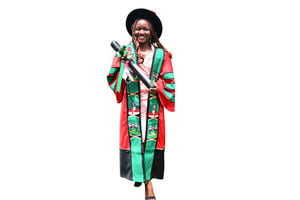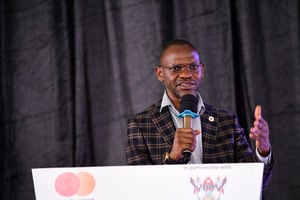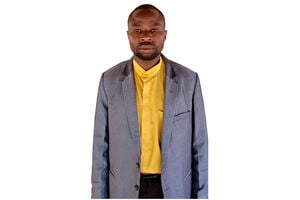
A teacher at Busia Trust School speaks to students at the implementation of mentorship programme. Through this programme teachers develop skills for effective handling of learners. PHOTO/DAVID AWORI.
The policy of mentorship in Uganda has been more pronounced in higher education institutions mainly universities, colleges and skills development institutions as a way of effective teaching and bringing up efficient graduates.
However, at lower education level, the policy has received less attention yet if this was emphasised, it would have a profound impact on the implementation of the lower secondary school curriculum currently being rolled out by the government.
A 2022, abstract paper on mentorship published by Kabale University defines mentorship at the workplace as a process where the more experienced colleagues use their greater knowledge and understanding of the work or workplace to support the development of junior or inexperienced staff or students.
The more knowledgeable and experienced workforce members become the mentors while the less experienced or newly recruited staff or students become mentees.
Peter Matsanga, an education specialist at Opportunity International, a non-governmental organisation, that supports a self-improvement programme in 700 private primary and secondary schools in the country, says mentorship, if emphasised would be the best programme for promoting the quality of teaching and learning in schools.
Matsanga thinks the lower secondary school curriculum currently being implemented is the best because it aims at bringing out the potential of every learner but should have been rolled out first with developing teacher mentors in schools.
He believes the implementation of the programme should have started with developing teacher mentors who would help impart special teaching skills and handling learning to the less experienced teachers who in turn employ the same methods to handle learners.
"This current programme requires teachers to have skills that ensure total learning takes place, where every learner is involved in the teaching-learning process," Matsanga stresses adding that the fact that the teachers have not been adequately prepared to implement the programme challenges of effective roll out remain.
Part of education policy
John Chrysostom Muyingo, the state minister for Higher Education, however, says mentorship is part of the education policy which skill he says is imparted to teachers while still in teacher training and is expected to be passed on to learners after their qualification.
"The first lady and minister of education, Janet Museveni, launched the mentorship programme two years ago with emphasis on each school having counsellor and teacher mentors,” Muyingo says.
He adds that the Ministry of Education and Sports implemented a phased retooling programme for all teachers in both government and private secondary schools to develop and improve the capacities of teachers to address various demands of the learners
Busia Trust Secondary School, a rural school in Busia District, where smuggling and poor academic grades are the order of the day, has implemented mentorship and the policy is turning fortunes for teachers in terms of improving their knowledge ability and delivery during the teaching-learning process while academic excellence has been the main benefit of the learners especially those offering science subjects.
Good performance
Statistics provided indicate that between 2020 and 2023, the school has registered remarkable academic progress.
In 2020, eight students were admitted to various public universities of Mbarara, Makerere, Busitema, Kyambogo, Gulu to offer science courses ranging from pharmacy, human medicine, civil telecommunication and mechanical engineering.
Two years later, seven were admitted and in 2023, six students were admitted to university for various science courses.
Nathan Wabwire, the director Busia Trust Secondary School, told Monitor that since the programme implementation in 2019, they have not looked back in terms of improving the knowledgeability and teaching skills of new teachers and the students who join the institution yearning for new learning experiences and knowledge.
"We embarked on implementing this programme after realising that majority of the teacher's capacity needed to be enhanced because there is nothing more important than continuous professional development of staff," Wabwire said.
Wabwire says they first had to undertake the needs assessment and established that they needed to enhance the quality of their teachers in several areas. These areas included culture development, school governance and administration plus teaching and learning areas.
Wabwire, says the first step involved the systematic training of teacher mentors, which involved improving their knowledge and competencies and learner-centred teaching and learning approaches. After training the core group of mentors, they had to identify teacher mentees who would be trained at departmental levels.
He reveals that in sciences, especially at A-Level, the school lacked teacher mentors. Conseqently, they had to outsource more knowledgeable and experienced teachers from other schools in different parts of the country.
He said in the teaching-learning situation, the mentored teachers employ modern methods of imparting knowledge and new experiences among learners which he sums up as, ‘See it, Name it and Do it’.
"In a typical learning situation, teachers demonstrate, learners see and name what is being demonstrated and then do what the teacher was demonstrating ". Wabwire explains.
This approach to learning has been a source of great academic dividends, especially in science subjects which formerly were no-go areas for our students. Through this, students who excel at A-Level after joining the university help in mentoring the continuing students
Ms Eunice Auma, the headmistress and a beneficiary of the training, says mentorship has changed the fortunes of teachers and learners.
Ms Auma highlights how the managerial skills of the top management have improved and as a result, they have been able to develop a five-year-old school strategic development plan, which enhances systematic implementation of quality learning.
"Can you imagine 12 out of a class of 21 students scored distinctions in Physics paper three (physics practicals ), in UACE 2020,"Auma reveals.
Continuous process
Auma says the mentorship programme is ongoing, and they keep enrolling new teachers and students who join the school to benefit from the vastly knowledgeable teachers
"We have had several of the teachers we mentor leaving to join government schools because they are good teachers, so we ensure the programme is continuous for the new teachers we recruit".
Fred Wabwire, the director of studies and one of the first beneficiaries of the programme when it was introduced in 2019, said this has helped him as head of teaching and learning to organise his teaching human resources, plan for how to get teaching and learning materials prepared and assembled early enough before beginning of every term.
"At the various departments, teachers make lesson notes, lesson plans and schemes of work for various levels before the beginning of every term," Wabwire explains adding that these are either approved or deferred for improvement in case gaps are identified.
Thereafter, they observe the lesson is not for fault finding but crediting the teacher in areas of strength and pointing out areas the new teacher can improve.
He said the observation team takes into consideration the various stages of lesson development taking key interest in aspects of lesson introduction, development, learner involvement in the teaching-learning process, availability and effective use of teaching-learning materials, use of visual aids in teaching and lesson conclusion.
The implementation of the mentorship programme has not only come with academic excellence but accolades and awards from reputable international organisations for their efforts to improve the conditions of learning in schools.
In 2019, the school won the Education Quality Award of Honorable Mention by Opportunity International Edufinance's Education quality awards and received a cash prize of $1,000.
Busia Trust School because of the resilience in implementing the mentorship progamme, was in the same year recognised among the top five most improved schools in Africa by the organisation.



